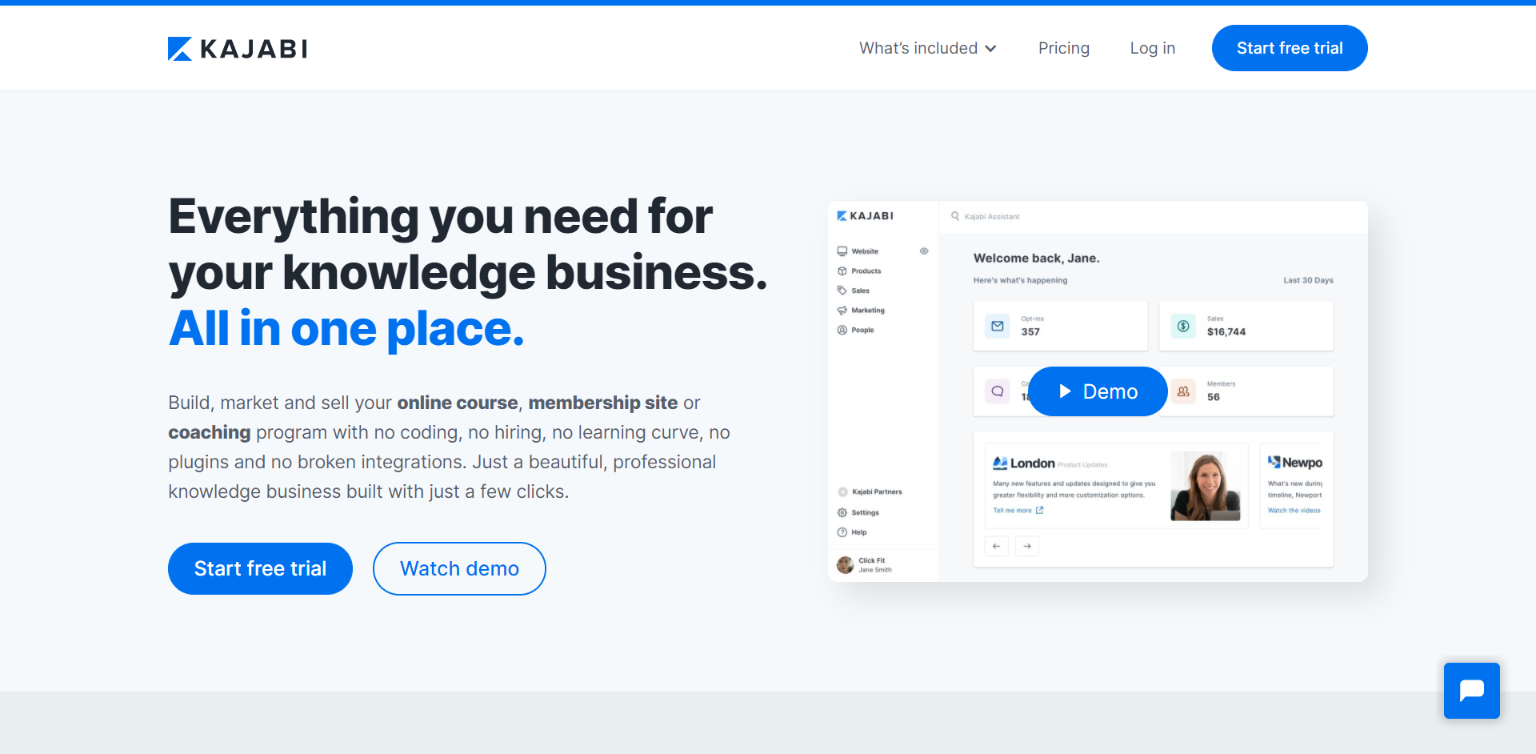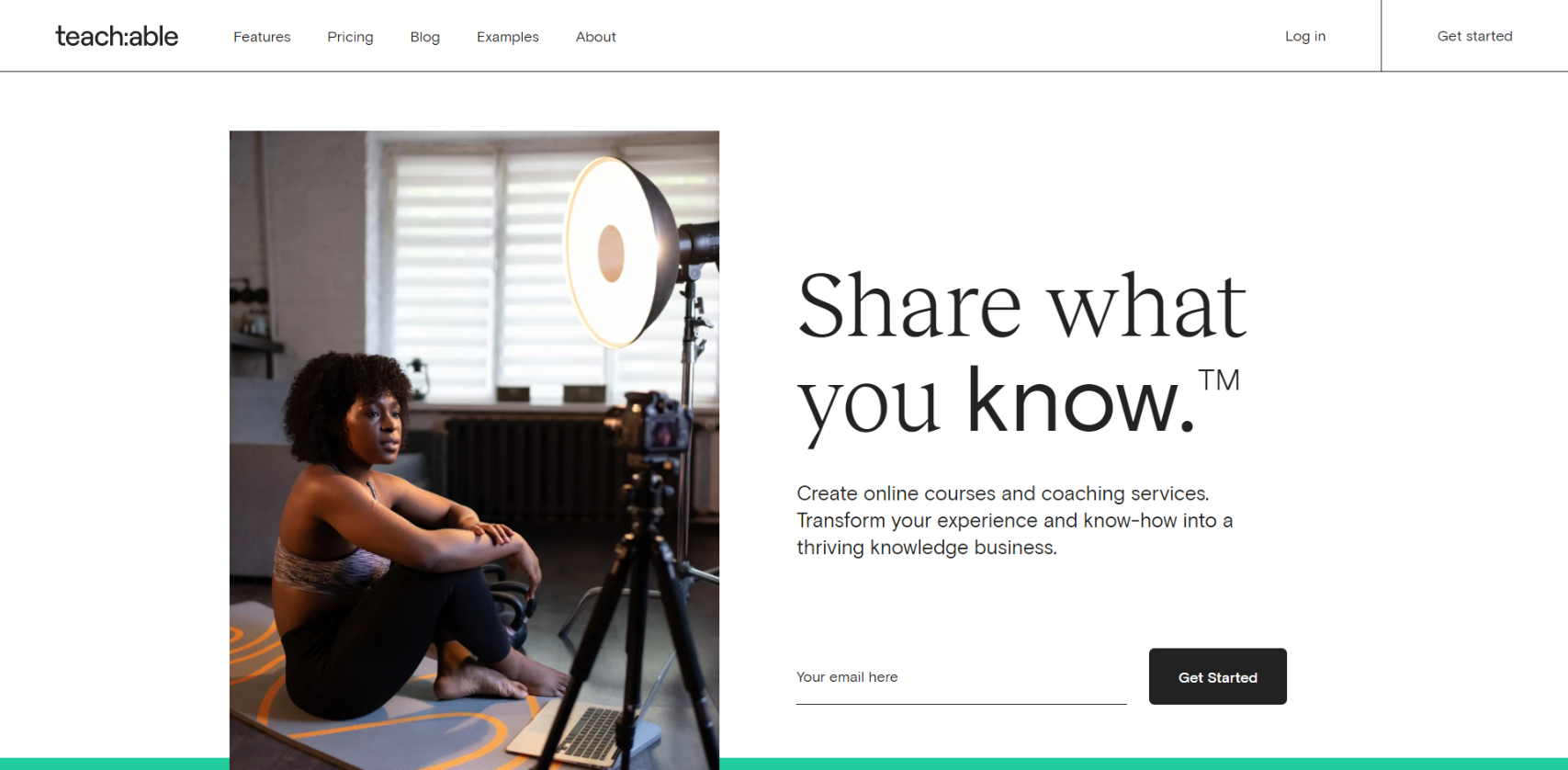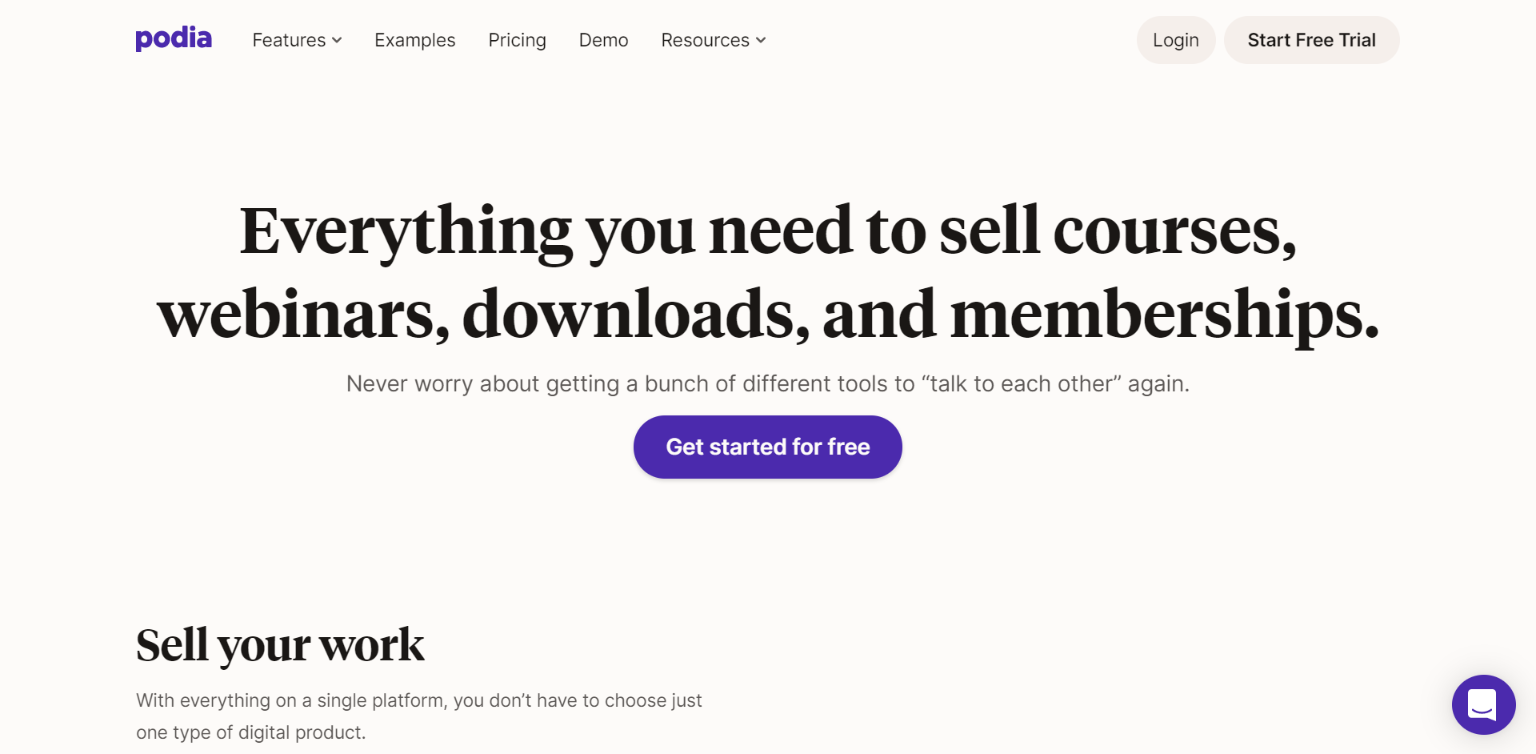Udemy is a massive provider of online courses, frequently seen as the default option for those looking to share their skills online. But are there better Udemy alternatives? If so, where are they, and why are so many of us still die-hard Udemy users?
In this blog, we'll explore Udemy's business model and how it works for you as an online instructor. We'll also take a deep dive into features of Udemy that limit course instructors' earnings and freedom to teach in their style and discuss Udemy alternatives that may enable online tutors to see better returns for their hard work.
We Recommend Thinkific Over Udemy.
We've spent countless hours reviewing the top providers and we prefer Thinkific's free plan over Udemy.
Unlike Udemy, Thinkific is completely free with no transaction fees. Plus you can set your own price to earn significantly more.
Visit Thinkific
We offer this website completely free to our visitors. To help pay the bills, we’ll often (but not always) set up affiliate relationships with the top providers after selecting our favorites. However, we do our best not to let this impact our choices. There are plenty of high-paying companies we’ve turned down because we didn’t like their product.
An added benefit of our relationships is that we always try to negotiate exclusive discounts for our visitors.
Why Consider Udemy Alternatives?
Let's get this clear off the bat: we're not out here to say Udemy is terrible. We think there's a lot to love about Udemy (read our full Udemy review for a list of pros and cons). Its gigantic marketplace is super-appealing when you're looking to start your career as an online instructor: after all, there's no business for you where there are no clients.
Beyond this, the platform is free to sign up, which means cost savings for a course instructor. Free sign-up isn't something we'll ever argue against: it's a massive perk for those with limited start-up resources who want to make a living sharing their knowledge or skills.
With all these perks, it's no wonder that Udemy has over 35 million users and hundreds of thousands of courses. It has quickly dominated the online course platform market.
So why consider Udemy alternatives? Well, while its essentials are very attractive to beginners, there are a few things you learn once you've been working with Udemy for a few months. We'll go over these drawbacks now.
1. Takes a Large Percentage of Sales
There's a balance between the volume of students you attract and the amount of money you get for attracting each student. Unfortunately, with Udemy, this balance doesn't work in favor of course instructors.
Udemy takes a cut of instructor revenue, including:
- 3% for each student you refer to your course
- 50% for each student who finds your course through the Udemy marketplace
- 75% for each student who finds your course through Udemy's advertising and affiliates
If you've got a big enough platform to market directly to your students, 3% won't seem like too much of a problem. However, most instructors don't have this kind of reach.
Losing 50-75% of your transaction fee every time you get paid is quite a big deal. At first, it seems fine: you're glad to be getting paid. However, trying to grow your tutoring into a viable business becomes difficult when at least half your fees are going to a third party.
With all these fees, it also means that Udemy isn't entirely free. It's free to upload and share content but not free to market it and have students enroll in it.
Unfortunately, you can't get around this without pricing yourself out of the market or using Udemy alternatives.
2. Restrictive Standards for Course Instructors
Udemy has its standards for course creators. You might think this is a good thing, and indeed, its design prevents scammers from taking advantage of customers. However, in reality, it severely limits the ability of course creators to do their job as they see fit.
You have to apply to become a premium instructor and wait two days for Udemy's approval. In addition, your course must abide by Udemy's standards. Such restrictions may impinge on academic freedom, making it harder for instructors to share knowledge.
Given that such platforms are supposed to enable us to share what we want, it seems counter-intuitive that we have to teach by somebody else's book.
3. Udemy Customers Expect Discounts
Besides the substantial fees extracted when someone accesses your course via their marketplace, you have to remember Udemy's business model relies on discounts and coupons.
You name a price that you believe reflects the value of what you're offering. It seems like a sound business model if you're thinking about upfront costs.
However, remember that this price is not the total amount that goes into your pocket. It gets cut by at least half for Udemy's share and even further because many customers only apply for a new course if there's a discount available.
4. Limited Pricing Options
Udemy's maximum course cost is $199.99. By using the platform, you agree to use one of Udemy's pricing options.
But what if you feel your course doesn't fit into one of these brackets?
If you're an expert in your field and your field is in demand, you can reasonably expect to charge more than $200 for your course. When a part of your income is already going to the platform, it's difficult to justify accepting a lower payment scheme because Udemy mandates it.
5. Internal Payment System
When you set yourself up on Udemy, you have to use its internal payment system. You can't set up a separate Paypal account, for example — but isn't that a plus? Not exactly.
Udemy's payment system means that you can't offer your students monthly debt management payment plans if your course is expensive. This model isn't great for business or instructors interested in leveling the playing field for lower-income students.
Also, you aren't able to offer ‘subscription’ payment models. You have to accept the one-off payment model if you're using the platform.
Alternatives to Udemy
Bearing these concerns in mind, we'd like to reiterate that we have nothing against Udemy or its community. You can gain traction quickly due to its community's excellent reputation for reviewing instructors. Our issue is that the cost of getting to a position where you have a loyal following on Udemy might not be worth it in terms of the money you lost to the platform along the way.
Below are some of the platforms we consider the best Udemy alternatives. We've outlined their payment plans, their internal costs for instructors, the freedom you have to teach as you wish, and their reach.
Thinkific
Best online course platforms for beginners


Thinkific is one of the best Udemy alternatives for several reasons:
- Its free plan has no transaction fees. Unlike Udemy, Thinkific's free plan is free. You won't have to pay for students signing up via the platform or affiliates. This unique attribute of Thinkific makes it one of the best among Udemy alternatives.
- Phone support. Among those of us seeking Udemy alternatives, many dislike the lack of phone support at Udemy. Thinkific has excellent customer service and phone support.
- Good payment options. The monthly pricing plans and other payment options mean you won't lose potential customers, such as students put off by large one-off payments.
- Great customization. Thinkific will host your website, but it also allows you to customize options to make your web page appear your own.
Thinkific has the minor drawback of not having a proprietary course marketplace. However, when you consider the fees you'd be experiencing without using Udemy alternatives like Thinkific, this isn't such a massive loss. Plus, Thinkific has excellent marketing tools available in its paid plans.
Pros
- No transaction fees on the free plan.
- Offers phone support for better customer service.
- Flexible payment options for students.
- Allows for great customization of course pages.
Cons
- Lacks a proprietary course marketplace like Udemy.
- May require more effort in marketing and student acquisition.
- Limited brand recognition compared to Udemy.
Read our full Thinkific review.
Kajabi
Best all-in-one online course platform


When it comes to Udemy alternatives, many users focus on improving their sales performance. Kajabi is perhaps the best of all Udemy alternatives in this regard. Its features include:
- No need for third-party tools. Kajabi has brilliant in-built marketing tools that mean you don't need to pay extra for third-party software. It is unique among Udemy alternatives in this regard.
- Enhanced sales/marketing focus. A common criticism of Udemy alternatives is that they lack the marketing software to justify their lack of reach compared to Udemy. After all, Udemy is still the biggest skills marketplace out there. Kajabi makes up for this with a strong focus on enabling users to market their business through in-built software.
- Money-back guarantee. Kajabi, like many Udemy alternatives, isn't free. The cost tends to be where Udemy takes its market share. However, Kajabi offers a money-back guarantee if you've tried out its software and were left unsatisfied. This guarantee is a statement of confidence in its abilities and makes this platform well worth a try.
Yes, you do have to pay for Kajabi. However, consider this: did you go into business expecting that you wouldn't face marketing costs? Far better to save for a strong opening than expect customers to come to you on the cheapest available platform and miss out on profits later.
Pros
- Comprehensive all-in-one platform with in-built marketing tools.
- No need for third-party tools, reducing additional costs.
- Offers a money-back guarantee, showcasing confidence in their service.
- Enhanced focus on sales and marketing.
Cons
- Higher cost compared to other platforms.
- May have a steeper learning curve for new users.
- Less focused on course marketplace, more on overall business tools.
Read our full Kajabi review.
Teachable


Teachable is well-known as one of the main Udemy alternatives (think of those YouTube video essays you love so much! Teachable is a big sponsor). Its benefits include:
- Flexible payment options: you can offer your students monthly payment plans for more expensive courses on this platform.
- Handles EU VAT: Teachable makes selling your services in the EU a lot easier with this service.
- Built-in Marketing Tool: Teachable makes it easy for you to market your course via email.
Teachable is worth considering among the Udemy alternatives, although its 5% transaction fee on its Basic Plan is a negative.
Pros
- Flexible payment options, including monthly plans for students.
- Handles EU VAT, making it easier to sell in the EU.
- Built-in marketing tools for email campaigns.
- User-friendly interface for both instructors and students.
Cons
- Charges a 5% transaction fee on its Basic Plan.
- Limited customization options compared to some competitors.
- May require additional marketing efforts for course visibility.
Read our Teachable Review.
Podia


We love Podia because it's so cheap compared with a lot of Udemy alternatives. Here's what this platform has to offer:
-
- Great customer support. Podia offers 24/7 customer support, which helps grow businesses and is not available through other Udemy alternatives.
- Payment plans available. For higher-cost courses, Podia lets you set up payment plans, which many users want when seeking Udemy alternatives.
- Developing features. Podia is constantly evolving and adding features to its platform.
Pros
- Affordable pricing compared to other platforms.
- Offers 24/7 customer support.
- Allows setting up payment plans for courses.
- Continuously adding new features and updates.
Cons
- Less established and recognized than platforms like Udemy.
- Limited course creation and marketing tools compared to others.
- Smaller community and marketplace for course exposure.
Read our full Podia review.
Best Alternative to Udemy
We'd recommend Thinkific and Kajabi as the best online course platforms and the winners as the best Udemy alternatives. Thinkific allows the rewards of success to go directly to the instructor, not the platform. Meanwhile, Kajabi has sophisticated in-built marketing tools that expand your business without the cost of add-ons.
We like Udemy, but for many instructors, there are better tools available. Give these Udemy alternatives a try and see how your online tutoring business grows from there.





















